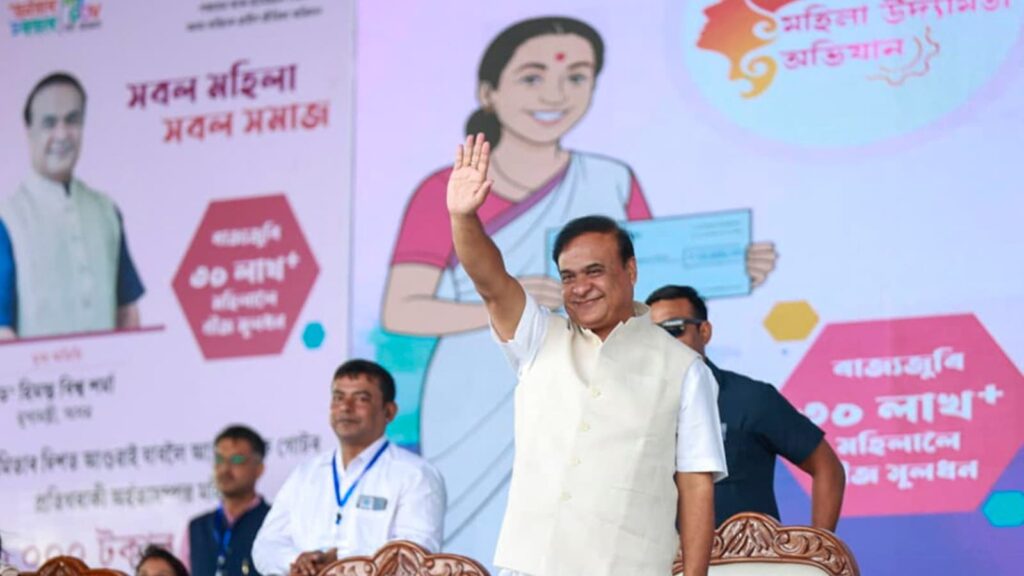The Mukhyamantri Mahila Rojgar Yojana that saw Rs 10,000 being deposited as first instalment in the accounts of 1.5 crore women in Bihar during the polls is being seen as one of the reasons for the NDA’s election sweep. A large part of the credit, say NDA leaders, goes to Assam Chief Minister Himanta Biswa Sarma.
Sarma, who will face Assembly elections in Assam soon, told The Indian Express he sent his bureaucrats about five months ago to Bihar on the request of the Nitish Kumar government. They made a presentation before then Bihar Chief Secretary Amrit Lal Meena, and then Development Commissioner and current Chief Secretary Pratyaya Amrit on a ‘Jeevika Rs 10,000 model’, that was later incorporated into the all-new Mukhyamantri Mahila Rojgar Yojana.
While JD(U) leaders acknowledge Sarma’s role, the party says the idea was more a result of “collective ideation”.
The scheme “was inspired by the vision of PM (Prime Minister Marendra Modi) to make 3 crore lakhpati didis”, Sarma told The Indian Express. “At the request of Sri Sanjay Jha (JD-U national working president), I, with my team of officers, gave a presentation to the Chief Secretary, Bihar, and important politicians five months back.”
“Even Madhya Pradesh’s Ladli Behna Scheme was inspired by Assam’s Arunoday,” Sarma said. The Mukhya Mantri Ladli Behna Yojana, involving payment of Rs 1,000 per month to each eligible woman, helped the BJP return to power in the tightly fought MP Assembly elections of 2023.
A BJP leader who attended the presentation held by the Assam team said Sarma and his officials stressed that Rs 10,000 be given as non-refundable seed money to women to come up with a business idea. “Our bureaucrats later worked it out and decided that an additional amount of up to Rs 2 lakh could be given to a woman (she or her husband must not be a taxpayer), in instalments, to start a business, depending on the viability of it,” the leader said.
A JD(U) leader said that the NDA started looking for a workable model that could be centred around women after RJD leader Tejashwi Yadav announced a ‘Maa Bahin Maan Yojana’ if the Mahagathbandhan came to power in Bihar, promising Rs 2,500 per month to each woman in the state, earlier this year. Sources said the NDA was worried about this as women were seen as loyal supporters of Nitish, and crucial to his return to power.
Nitish was also under pressure as, while he headed a Mahagathbandhan government in 2023, he had announced that after the publication of the Bihar 2022-23 caste survey report, one member each of the 94,000 families earning less than Rs 6,000 a month in the state would be given Rs 2 lakh each year.
The RJD and the Jan Suraaj had been questioning Nitish over the failed promise.
A JD(U) leader said: “Our national working president Sanjay Jha requested Assam CM Sarma to suggest ways because the Jeevika model was started by Assam first.”
The Assam State Rural Livelihoods Mission, which is similar to the Bihar Jeevika model, focuses on empowerment of rural communities through self-help groups, and has a pool of community cadres, including Jeevika Sakhis.
JD(U) chief spokesperson Neeraj Kumar told The Indian Express that the Rs 10,000 scheme, which became popularly known as “das-hazari” during the polls, was “the result of collective ideation”.
Giving the example of other schemes, including the National Rural Livelihood Mission (NRLM), Kumar said: “For that matter, we have a similar ongoing scheme – Satat Jeevikoparjan Yojana – under which a person once engaged in toddy business is given Rs 10,000 to start an alternative business, with additional assistance up to Rs 2 lakh. The Rs 10,000 Jeevika scheme is a universalisation of that idea, with our thinktank in politics and bureaucracy working it out under the Mukhyamantri Mahila Rojgar Yojana.”
BJP spokesperson Kumkum Bhardwaj said the Modi-led NDA government at the Centre deserved credit for the “das-hazari” scheme as it is the NRLM which funds Jeevikas, known as Ajeevikas at the Centre. She added: “The Pradhan Mantri Jan-Dhan Yojana became the first door that opened true financial inclusion for women… The NRLM became the backbone of this transformation.”
According to Bharwaj, “This is a renaissance, with the crown of India’s women-led economic growth resting firmly on the transformative leadership of PM Modi.”
The Opposition questioned the timing of the “das-hazari” scheme, with 1.21 crore women getting Rs 10,000 into their bank accounts before the model code of conduct came into effect, but another 30 lakh women receiving it after the elections were announced.
Jan Suraaj leader Prashant Kishor, who held a press conference on the party’s poor performance in the Assembly elections Tuesday, alleged that “government machinery” including Jeevikas were used to “lure people” in Bihar. “In every Assembly seat, at least 60,000-62,000 people were given Rs 10,000 and promised a Rs 2 lakh loan. Government officials on duty were telling people they would get the loan only if the NDA returned to power. Jeevika didis were put on duty for this,” he said.

